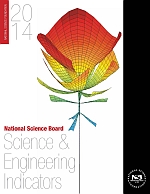
Public opinion about evolution, the Big Bang, and teaching evolution in public schools was reviewed in the National Science Board's Science and Engineering Indicators (PDF) 2014.
The 2012 General Social Survey experimented with two versions of true/false questions addressing evolution and the Big Bang. Half of the survey respondents received versions focusing on the natural world — "human beings, as we know them today, developed from earlier species of animals" and "the universe began with a big explosion" — while half received versions focusing on the scientific community — "according to the theory of evolution, human beings, as we know them today, developed from earlier species of animals" and "according to astronomers, the universe began with a big explosion."
According to the NSB's report, "For evolution, 48% of Americans answered 'true' when presented with the statement that human beings evolved from earlier species with no preface, whereas 72% of those who received the prefaced said 'true,' a 24 percentage point difference. ... For the big bang question, the pattern was very similar: in 2012, 39% of Americans answered 'true' when presented with the statement about the origin of the universe without the preface, whereas 60% of those who heard the statement with the preface answered 'true.' This represents a 21 percentage point difference" (p. 7-21).
As NCSE previously reported, the questions about evolution and the Big Bang were deleted from the 2010 edition of Science and Engineering Indicators, a decision which drew criticism at the time, including from veteran science literacy researcher Jon Miller, who originally devised the question about evolution, and from NCSE's Joshua Rosenau. The NSB eventually acknowledged that it was a mistake, and in the 2012 edition, as in the 2014 edition, the questions about evolution and the Big Bang were discussed. But in the 2010 edition and in all subsequent editions, those questions are not used in the assessment of scientific literacy.
"Public views about evolution and the role of teaching evolution in the schools have been relatively stable over the course of 30 years," according to the NSB's report, which highlights two key patterns, citing work by Michael Berkman and Eric Plutzer. "First, when asked whether intelligent design should be taught alongside or in addition to evolution, a majority of Americans favor this approach to education." "Second, when asked whether creation should be taught instead of evolution — thereby replacing it in the science curriculum — a majority oppose those idea, but a sizeable minority favors it" (p. 7-45).
A variety of reports and commentaries on previous polls about public opinion about evolution and teaching evolution is available on NCSE's website.
